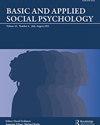大多数人认为自己比其他人更环保:感知环保行为参与的效果优于平均水平
IF 1.8
3区 心理学
Q2 PSYCHOLOGY, SOCIAL
引用次数: 24
摘要
摘要人们往往认为自己在各种情况下都比一般人好。在这篇文章中,我测试了优于平均水平的效果(BTAE)是否也适用于环保行为参与。实验1使用了一个具有代表性的大样本,支持大多数参与者报告说他们比其他人更环保。实验2在另外3种文化(美国、英国和印度)中验证了这些发现,并表明BTAE既适用于抽象的(其他美国人),也适用于具体的(我的朋友)比较。实验3发现,参与者高估了他们参与环保行动的“程度”和“频率”。最后,实验4发现,诱导BTAE会抑制未来的环保行为这一假设得到了微弱的支持。本文章由计算机程序翻译,如有差异,请以英文原文为准。
Most People Think They Are More Pro-Environmental than Others: A Demonstration of the Better-than-Average Effect in Perceived Pro-Environmental Behavioral Engagement
Abstract People tend to perceive themselves as better than average in various contexts. In this article I test if the better-than-average effect (BTAE) also holds for pro-environmental behavioral engagement. Experiment 1 supported that the majority of participants report to be more pro-environmental than others, using a large representative sample. Experiment 2 validated these findings in 3 additional cultures (United States, United Kingdom, and India) and showed that BTAE held for both abstract (other Americans) and concrete (my friends) comparisons. Experiment 3 found that participants overestimated both how “much” and how “often” they engage in pro-environmental actions. Finally, Experiment 4 found weak support for the hypothesis that inducing BTAE are inhibiting future pro-environmental behaviors.
求助全文
通过发布文献求助,成功后即可免费获取论文全文。
去求助
来源期刊

Basic and Applied Social Psychology
PSYCHOLOGY, SOCIAL-
CiteScore
4.50
自引率
12.50%
发文量
7
期刊介绍:
Basic and Applied Social Psychology (BASP) emphasizes the publication of outstanding research articles, but also considers literature reviews, criticism, and methodological or theoretical statements spanning the entire range of social psychological issues. The journal will publish basic work in areas of social psychology that can be applied to societal problems, as well as direct application of social psychology to such problems. The journal provides a venue for a broad range of specialty areas, including research on legal and political issues, environmental influences on behavior, organizations, aging, medical and health-related outcomes, sexuality, education and learning, the effects of mass media, gender issues, and population problems.
 求助内容:
求助内容: 应助结果提醒方式:
应助结果提醒方式:


